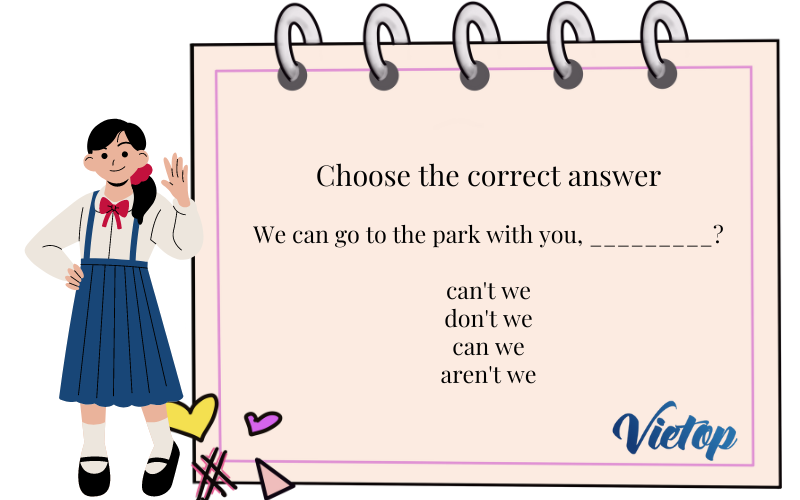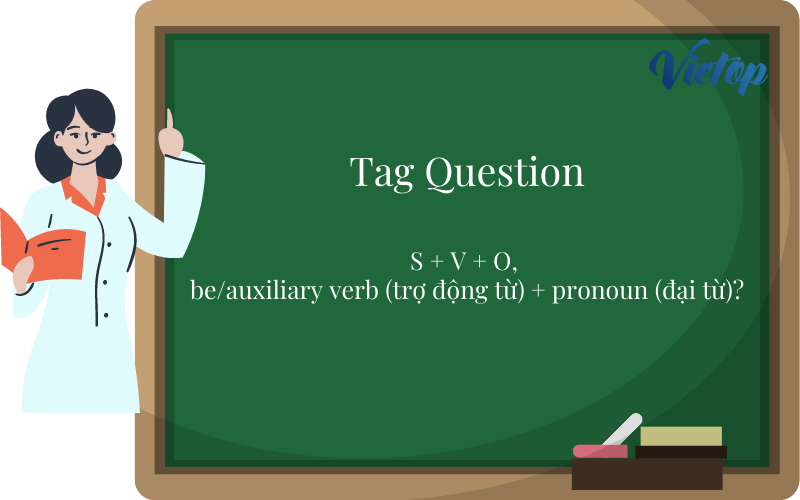Với bài viết hôm nay, Luyện thi IELTS Vietop mời các bạn cùng chúng mình hệ thống lại kiến thức về Tag Question – câu hỏi đuôi trong tiếng Anh qua phần tổng quát định nghĩa, công thức, cách sử dụng và một số bài tập câu hỏi đuôi trắc nghiệm nhỏ.

Tổng quan về Tag Question
Định nghĩa
Câu hỏi đuôi (Tag Question) là dạng câu hỏi đóng Yes-No được đặt ở sau một mệnh đề trần thuật và phân cách với mệnh đề trần thuật bằng dấu phẩy.
Câu hỏi đuôi gồm 2 phần là mệnh đề chính và phần “đuôi” như sau: Statement, tag question?
E.g.: She‘s a doctor, isn’t she? (Cô ấy là bác sĩ, phải không?)
You haven’t seen this film, have you? (Bạn chưa xem bộ phim này mà, phải không?)
Bạn có thể thấy rằng khi ta tạo thành một câu hỏi đuôi, quy tắc đầu tiên chính là thể của tag question luôn luôn ngược lại với phần mệnh đề chính. Nếu câu ở mệnh đề chính được chia ở dạng khẳng định, thì câu hỏi đuôi sẽ là phủ định và ngược lại.
| Mệnh đề chính (statement) | Phần đuôi (tag question) |
| Positive She‘s a doctor, |
Negative isn’t she? |
| Negative You haven’t seen this film, |
Positive have you? |
Cấu trúc chung
Dưới đây là cấu trúc chung của một Tag Question:
| S + V + O, be/auxiliary verb (trợ động từ) + pronoun (đại từ)? |
E.g.: They could hear me, couldn’t they? (Họ có thể nghe thấy tôi, phải không?)
James doesn’t play the piano, does he? (James không chơi piano, phải không?)
Lưu ý:
- Chủ ngữ của mệnh đề chính và câu hỏi đuôi là một. Nếu chủ ngữ của mệnh đề chính là danh từ thì các bạn sẽ dùng đại từ của danh từ đó để thay vào câu hỏi đuôi.
James doesn’t play the piano, does he?
→ Ta thấy trợ động từ doesn’t ở mệnh đề chính sang Tag Question thành does, đại từ chủ ngữ của James sang Tag Question thành he.
- KHÔNG dùng đại từ tân ngữ (me, you, him, her, them, us) ở câu hỏi đuôi.
E.g.: They are doctors, aren’t them? – là sai
– KHÔNG dùng tên riêng ở câu hỏi đuôi mà phải dùng đại từ nhân xưng.
E.g.: Jena is a doctor, isn’t Jena? – là sai
– KHÔNG dùng “am not I” mà phải dùng “aren’t I” cho câu hỏi đuôi.
E.g. : I am late, aren’t I? (Tôi đi muộn, phải không?)
Bài tập câu hỏi đuôi trắc nghiệm

Bài 1: Choose the correct answer
- Xavier is English, _________?
- does he
- is he
- isn’t he
- doesn’t he
- We can go to the park with you, _________?
- can’t we
- don’t we
- can we
- aren’t we
- He never goes to bed before 11 o’clock, _________?
- isn’t he
- is he
- doesn’t he
- does he
- Those cars are very expensive, _________?
- are cars
- aren’t they
- aren’t cars
- are they
- You didn’t play badminton last week, _________?
- did you
- didn’t you
- aren’t you
- haven’t you
- She has got a lot of shoes, _________?
- does she
- doesn’t she
- hasn’t she
- haven’t she
- Everyone came to the wedding yesterday, _________?
- weren’t they
- wasn’t it
- isn’t it
- didn’t they
- There are a lot of students here, _________?
- aren’t they
- aren’t there
- don’t they
- do there
- I am the tallest in my group, _________?
- don’t I
- amn’t I
- aren’t I
- am I
- Let’s go to the movie, _________?
- shall we
- don’t we
- do we
- aren’t we
Bài 2: Choose the correct answer
- He’s still sleeping, ________
- is not he?
- isn’t he?
- wasn’t he?
- You do go to work, ________
- do you?
- aren’t you?
- don’t you?
- Let’s go for a walk, ________
- shall we?
- shan’t we?
- will we?
- We won’t be late, ________
- won’t we?
- will we?
- are we?
- Nobody called, ________
- do they?
- didn’t they?
- did they?
- They will wash the car, ________
- will it?
- won’t they?
- wouldn’t they?
- We must lock the doors, ________
- mustn’t they?
- shouldn’t we?
- mustn’t we?
- I’m right, ________
- amn’t I?
- am not I?
- aren’t I?
- So you bought a car, ________
- did you?
- haven’t you?
- weren’t you?
- You wouldn’t like to invite Anna, ________
- did you?
- would you?
- won’t you?
Bài 3: Choose the correct answer
- My nickname in the office is “Slugger”, ____?
- isn’t it?
- aren’t I?
- am I?
- Clifton was the place we went for that rainy vacation, ____?
- isn’t it?
- isn’t there?
- wasn’t it?
- She’s your best friend! You should come to her party, ____?
- shouldn’t you?
- isn’t she?
- should you?
- The price of gas hasn’t fallen much recently, ____?
- has it?
- is it?
- will it?
- There are too many chairs here, ____?.
- are they?
- isn’t there?
- aren’t there?
- The weather won’t improve if we sit here and look out the window, ____?
- will we?
- will it?
- won’t it?
- Everyone can hear me at the back of the room, ____?
- can you?
- can’t you?
- can’t they?
- I’m late again, ____?
- amn’t I?
- aren’t I?
- am I?
Bài 4: Choose the correct answer
- Neither of the workers was happy with the new legislation, ____?
A) wasn’t they
B) weren’t they
C) did they
D) didn’t they
E) were they
- Tom, the Browns’ only son, died in a terrible accident last year. Before that event, however, the family used to be very cheerful people, ____?
A) hadn’t they
B) didn’t they
C) weren’t they
D) didn’t he
E) wasn’t it
- That is very important for him, ____?
A) isn’t it
B) isn’t that
C) is it
D) is that
E) isn’t this
- Everybody should visit Goreme, ____?
A) should they
B) should he
C) shouldn’t they
D) should we
E) shouldn’t we
- Tomorrow instead of going to Madrid with my boss. I am going to London, ____ ? So, is everything arranged properly there?
A) am n’t I
B) aren’t I
C) don’t I
D) won’t I
E) am I
- As far as I know Jim, and according to what his mum told about him, he hates football and never plays it,____?
A) didn’t he
B) will he
C) does he
D) didn’t she
E) don’t I
- You really think that those over there are our new teacher’s kids, ____? But, they aren’t because he isn’t married yet.
A) isn’t it
B) don’t you
C) aren’t they
D) do you
E) isn’t he
- They had to provide some evidence to the court to clear him of the accusation, ____?
A) wouldn’t they
B) hadn’t he
C) didn’t he
D) hadn’t they
E) didn’t they
- Just because the teacher of math has strict rules in class, everybody dislikes him too much, ____?
A) aren’t they
B) isn’t it
C) doesn’t it
D) do they
E) don’t they
- I suppose they won’t come in time for lunch, ____?
A) won’t they
B) aren’t I
C) don’t I
D) will they
E) do you
Bài 5: Choose the correct answer
- It is raining,…?
a) Is it?
b) Isn’t it?
c) Has it?
d) Is not it?
- He likes cricket,…?
a) Isn’t he?
b) Does he?
c) Doesn’t he?
d) Is he?
- Remember to lock the door,…?
a) Will you?
b) Shall not you?
c) Won’t you?
d) Haven’t you?
- She hardly knows you,..?
a) Don’t she?
b) Does she?
c) Is she?
d) Doesn’t she?
- Everyone can’t come in now,..?
a) Can’t they?
b) Did they?
c) Can they?
d) Couldn’t they?
- None of us knew the way,…?
a) Do we?
b) Didn’t we?
c) Could we?
d) Did we?
- I am intelligent,…?
a) Aren’t I?
b) Am I?
c) Amn’t I?
d) Isn’t it?
- Some of you are learning French,…?
a) Are you?
b) Aren’t you?
c) Did you?
c) Do you?
Đáp án
Bài 1
- isn’t he?
- don’t you?
- shall we?
- will we?
- did they?
- won’t they?
- mustn’t we?
- aren’t I?
- did you?
- would you?
Bài 2
- isn’t he?
- don’t you?
- shall we?
- will we?
- did they?
- won’t they?
- mustn’t we?
- aren’t I?
- did you?
- would you?
Bài 3
- isn’t it?
- wasn’t it?
- shouldn’t you?
- has it?
- aren’t there?
- will it?
- can’t they?
- aren’t I?
Bài 4
| 1 | 2 | 3 | 4 | 5 | 6 | 7 | 8 | 9 | 10 |
| E | B | A | C | B | C | B | E | E | D |
Bài 5
- b) Isn’t it?
- c) Doesn’t he?
- a) Will you?
- d) Doesn’t she?
- c) Can they?
- a) Do we?
- a) Aren’t I?
- b) Aren’t you?
Hy vọng với phần ôn lại kiến thức cũng như hoàn thành các bài tập câu hỏi đuôi trắc nghiệm, Vietop đã giúp các bạn nắm vững hơn về cách sử dụng cấu trúc ngữ pháp đặc biệt này trong cuộc sống hằng ngày. Chúc các bạn học thật tốt và hãy cùng chờ đón những bài viết tiếp theo từ chúng mình nhé!
source https://www.ieltsvietop.vn/blog/grammar/bai-tap-cau-hoi-duoi-trac-nghiem/
Nhận xét
Đăng nhận xét